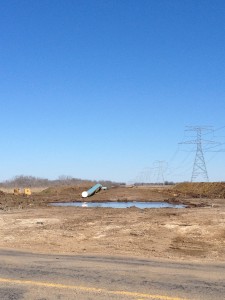I’m not sure how the month of January has already drawn to a close, but I hope everyone has enjoyed the first 30 days of the new year! This month has brought two great speaking opportunities. First, I spoke to beef producers from Texas and New Mexico at the Southwest Beef Symposium in Amarillo, where I presented on legal resources for agricultural producers. Last week, I traveled to Atlanta to speak at the Southern Dairy Conference. There, I presented on how to prevent and survive and undercover video crisis on a dairy farm. Both of these were great groups and to those of you new to the blog from these presentations, welcome!
Here are some of the ag law stories in the news the last couple of weeks.
*Another Proposed Water Pipeline Project Causing Controversy. The Texas Tribune published an article discussing a proposed pipeline project that would pump and transport groundwater from Hays County, Texas to the suburbs of Austin including the City of Buda. Like the project approved earlier this year to take water from rural Burleson County to San Antonio, many residents are concerned that this type of project will drain the aquifer beneath Hays county dry. Nevertheless, the Buda City Council voted to sign a contract with a water supplier last week. This proposed project also highlights a gap in Texas groundwater law. In the majority of Texas counties, groundwater pumping is governed by rules of local Groundwater Conservation Districts. But in some counties, Hays included, no Groundwater Conservation Districts exist, meaning there are essentially no limits on pumping. This is an interesting situation and a good overview of Texas groundwater law. [Read articles here.]

*Federal Judge Finds Mora County’s Oil and Gas Production Ban Unconstitutional. Judge Jim Browning, a federal judge in New Mexico, has invalidated the oil and gas production ban passed by Mora County. His 199 page opinion is available here. I will have a full blog explaining the Judge’s decision next week.
* Utah Prosecutors Drops “Ag Gag” Charges Against Animal Rights Activists. Utah prosecutors have dismissed charges of animal operation interference under the state’s farm protection law, commonly called an “ag gag” statute. Charges under the statute were filed against four members of the Farm Animal Rights Movement who recorded footage of a hog farm in Southwestern Utah. The group members claim that their footage was shot while on a public road (which would not violate the statute, but charges alleged they trespassed on private property to film the video (which does violate the statutory provisions). The charges were dropped at the request of the hog farm. In an unrelated lawsuit, the Utah statute at issue is currently being challenged in federal court. [Read article here.]
* Washington State Proposes “Ag Gag” Bill. Washington lawmakers proposed a bill similar to those passed in 7 other states that would criminalize undercover video investigations on agricultural operation in certain circumstances. Committee testimony was hard on the bill last week, where opposition to the bill was strong, but at least one member claims that supporters of the bill–most of whom are involved in the agricultural industry–were fearful of speaking in its favor. [Read article here.]
* Location, Location, Location. No, we’re not talking real estate here, we are talking estate planning documents. A New York Times article titled There’s More To Estate Planning Than Just the Will” highlighted the idea that preparing estate planning documents is only the first step, it is also extremely important to ensure that someone trustworthy knows the location of all important documents. The article shares a story of one veteran who passed away and wanted to be buried at Arlington National Cemetery, but failed to inform his children of where his military discharge papers (required for burial) were located. This caused a frantic, panicked search for the family in an already difficult time. Be sure to store your estate planning documents (and other important paperwork) in a safe location and share that location with those who need to know. [Read article here.]












